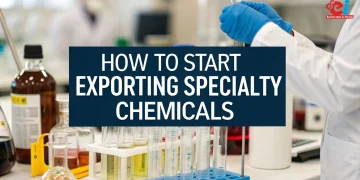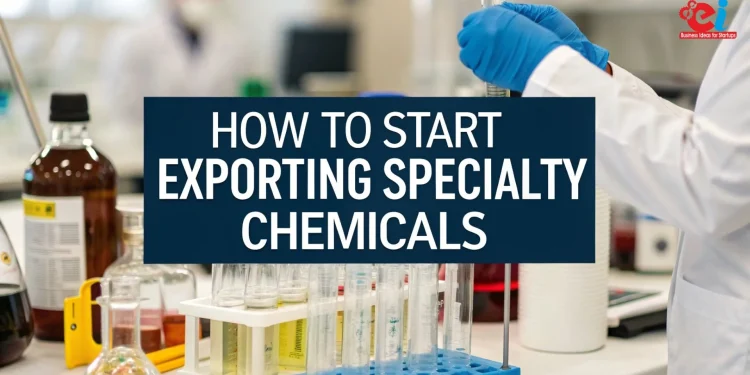The entire structure of India’s Specialty chemicals export industry is gradually evolving. The volume maintained by solvents and acids is still significant, but growth, recognition, and margins stem from the specialty chemicals market. There is a brand new window of opportunity for startups and fresh players to target high-value specialty chemicals and build NMP, DMF, Morpholine, and other pharma intermediate value chains that thrive on global competitiveness.
This article serves as a complete blueprint for startups seeking entry into the realms of exporting specialty chemicals– outlining the business policies, industry regulatory structure, ergonomic hurdles, dominant products, and logistics in the marketplace to aid in scaling from laboratory production to international distribution.
What Makes Them Ideal Specialty Chemicals Targets For Exportation?
These compounds are bespoke in nature, meaning designed for very specific tasks, and strikingly expensive while being low in volume– hence categorizing them with high value. The degree of precision, purity, and performance required by these specialty chemicals segments renders them more expensive than bulk chemicals, resulting in superior pricing, brand worship, and unparalleled customer loyalty.
The foundation of India’s economy rests on its specialty chemical production. India’s strengths include its synthetic chemistry foundation, skillful R&D, and a developing regulatory framework which aids specialty chemicals exports.
Exports of specialty chemicals aid with:
- Increased profit margins
- Application across various industries
- Less competition because of complicated formulations
- Custom synthesis and contract manufacturing prospects
Under the Make In India initiative and Production Linked Incentive (PLI) schemes, the Government of India has also identified specialty chemicals as a target sector and has subsequently increased policy and infrastructure support for these exporters.
Most Sought Specialty Chemicals
According to the Chemical Weekly export listings of May 27, 2025, the following specialty chemicals also ranked amongst the most traded globally:
- N-Methyl-2-Pyrrolidone (NMP) – Used as a polar aprotic solvent in the pharmaceutical industry, for lithium battery production, and paint removal. Major exports NMP is Europe, Korea, and the US.
- Dimethylformamide (DMF) – It is employed in APIs as well as synthetic resin and agrochemical production. India has placed itself as one of the top producers of DMF.
- Morpholine – Used pharma intermediates, in rubber chemicals, and as corrosion inhibitors. Exported from India to EU and ASEAN countries.
- Piperidine – Examined as a central nervous system drug, is a pharmaceutical intermediate of high market value.
- Ethyl Acetoacetate & Methyl Acetoacetate – Crucial precursors in the production of pigments, dyes, and vitamins.
- Dimethyl Acetamide (DMAC) and Diethylaminoethanol (DEAE) – Important in high-tech electronics, as well as in coatings and resin.
These goods are Custom Cleared Exported in bulk drums and demand strict Maintenance of Quality, handling and documentation requirements.
Related: Start a Specialty Chemicals Business in India: High-Growth MSME Opportunity
Regulatory Compliance for Exporting Specialty Chemicals
Setting up Ethos Display Technologies Private Limited as a business venture of specialty chemicals needs both domestic and International scrutiny and regulations to be followed. In my opinion, these are the must-haves for every new business.
1. Indian Regulations
- Apply to DGFT, and procure an Import-Export Code (IEC).
- Abide by the Chemical Accidents Rules (EP Act-1989).
- Get requisites from the State’s Pollution control board.
- For certifying intermediates in pharmaceuticals, get licenses certifying drugs.
2. International Standards
- Uphold REACH regulations for exports to Europe.
- Adhere to GHS labeling and SDS for US and OECD market.
- Yield to RoHS regulations for electronics exports.
- Accompany every shipment with Certificates of Analysis (COA), TDS and MSDS.
Use of barcoded labels, tamper proof Tamper Proofing, third party lab certifications increase credibility in these markets.
Setting Up For Export: Infrastructure and Logistics
Startups intending to go from lab scale operations to ready to exportable business should set up facilities in production, packaging and logistics to achieve this.
Production Facility
- Plant producing pharmaceutical intermediates is GMP compliant.
- There is a pilot plant and an R&D section for process validation.
- Qualified Quality Control lab and HPLC, GC, and IR spectroscopy grade equipment.
Packaging
- 200 liter MS/HDPE drums for bulk solvents.
- Intermediate products in aluminum lined bags or fiber drums.
- Professional grade chemicals in containers approved by UN.
Export Logistics
- Work with licensed chemical freight forwarders.
- ICDs and ports like Nhava Sheva, Kandla, or Mundra are also used.
- Permits are obtained under Hazardous Waste Rules for some products.
- Marine cargo and hazardous goods insurance are arranged.
Strategic custom documentation along with filing with DGFT, and keeping MSDS ready at the port guarantees trouble free custom clearance.
Related: Assessing the Specialty Chemical Industry in India
Crucial Steps to Export and Reasons for Marketing Demands
Indian speciality chemicals are well accepted both in developed and emerging markets.
Key Targeted Markets Include
- Europe: Very high demand for REACH compliant NMP and Piperidine but tough regulations.
- USA: Major buyers for pharma intermediates, DMF and Morpholine.
- South Korea and Japan: Sourced by advanced electronics and battery manufacturers for solvents and polymer intermediates.
- Middle East and Africa: Growing market for construction and agrochemical additives.
Export Drivers
- The movement of supply chains from China to India.
- Worldwide impetus towards diversification of supply chains.
- Increase in specialty chemical outsourcing from the EU/US.
- Rapid increases in APIs, EVs, and coatings.
Challenges Startups Face
However, with high potential, startups might face the following challenges:
- Slow moving regulatory processes and backlogs of waiting for export permits.
- The third-party audits and compliance checks are financially burdensome.
- Risk pertaining to exchange rate volatility and credit from foreign clients.
- Insufficient working capital required to fulfill huge export contracts.
- Insufficient international brand identity and lack of buyer confidence greatly affect prospects.
Solutions
- Apply for membership to INDs such as CHEMEXCIL, ICC, or Pharmexcil.
- Attend international exhibitions such as CPhI, ChemSpec, and ArabLab.
- Collaborate with NPCS for project planning and documentation.
How NPCS Aids Specialty Chemicals Exporters
NPCS deals with assisting startups to increase the scope of their chemical businesses globally. With years of experience along with specialized databases, NPCS offers:
- Custom market analysis DPRs for small-scale specialty chemical units.
- Marketing primary and secondary data analysis and profit scope evaluation.
- Detailed designs for the plant structure and component selection.
- Financial plans including return on investment and break-even point calculations.
- Supporting the creation of MSDS, REACH dossiers, and ensuring GHS compliance
- Assistance in acquiring IEC, PCB NOC, and export control permits
NPCS aids clients in developing export pitch decks, connecting with buyers, and navigating international regulations so they are prepared to export on day one.
Conclusion
Strategically, India has an edge in becoming the world’s foremost exporter of specialty chemicals.
Startups concentrating on R&D and considering regulatory frameworks and compliance along with supply chains stand to benefit from India’s credibility in global markets.
There is a tremendous opportunity in India for entrepreneurs to turn chemical laboratory ideas into scalable business solutions by targeting high-value molecules.
With the right guidance, technical support, and market access provided by seasoned consultants like NIIR Project Consultancy Services, Indian entrepreneurs can optimally leverage Indian resources for success in global trade.


















